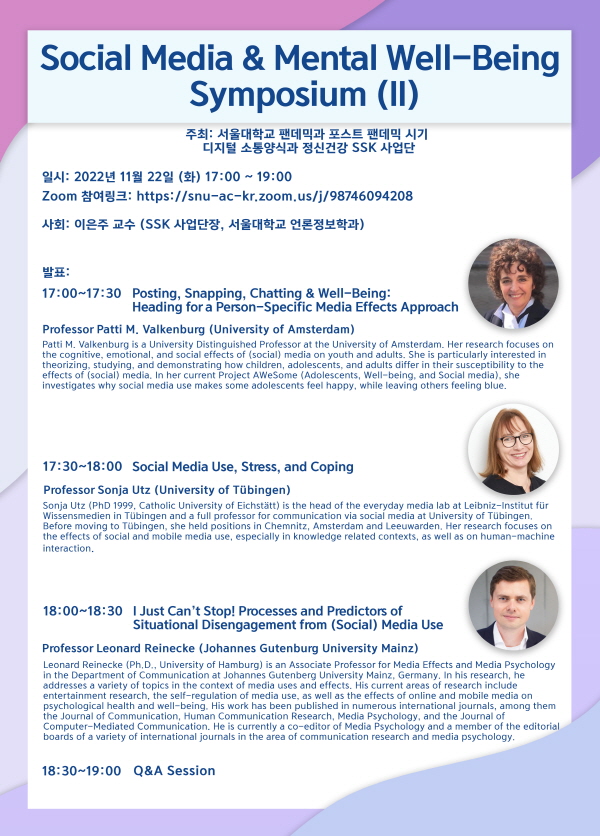참여연구집단
연구집단활동
[팬데믹과 포스트 팬데믹 시기 디지털 소통양실과 정신건강 SSK사업단] Social Media & Mental Well-being Symposium II 개최
View : 16,599
| Date | 2022.11.16 | Name | SSK |
|---|---|---|---|
| Attachment | 서울대 ssk.jpg | ||
|
안녕하세요, 서울대학교 팬데믹과 포스트 팬데믹 시기 디지털 소통양식과 정신건강 SSK 사업단(단장 이은주 서울대 교수)에서 Social Media & Mental Well-being 2차 온라인
심포지엄을 개최합니다. 많은 분들의 관심과 참여 부탁드립니다
Social Media &
Mental Well-being Symposium II
주최:
서울대학교 팬데믹과 포스트 팬데믹 시기 디지털 소통양식과 정신건강 SSK 사업단
일시:
2022년 11월 22일 화요일 17시~19시 Zoom 참여링크: https://snu-ac-kr.zoom.us/j/98746094208 사회: 이은주 교수 (SSK 사업단장, 서울대학교 언론정보학과)
발표: 17:00 ~ 17:30 Posting, Snapping, Chatting & Well-Being: Heading for a Person-Specific
Media Effects Approach - Professor
Patti M. Valkenburg (University of Amsterdam) 발표내용: In this presentation, Patti Valkenburg will discuss the results of two experience sampling studies into the effects of social media use on adolescents’ well-being. By adopting a person-specific method to study media effects, she will demonstrate
how strikingly the effect of social media use on well-being differs from
adolescent to adolescent.
17:30 ~ 18:00 Social media use, stress, and coping. - Professor
Sonja Utz (University of
Tübingen) 발표내용: It is often assumed that social media use causes stress. However, the (potential) relationship between social media use and stress is more complex. In this talk, I will review the various role social media can play in the different stages of the stress-coping process: as stressors, resources, and as coping tools. I will discuss the empirical
evidence for the different hypotheses and point out methodological challenges.
18:00 ~ 18:30 I just can’t stop! Processes and Predictors
of Situational Disengagement from (Social) Media Use - Professor Leonard Reinecke
(Johannes Gutenberg University Mainz) 발표내용: Constant connectedness and the ubiquitous availability of media content and mediated communication confront users of mobile and social media with new and growing challenges for self-regulation and self-control. Immediate and hedonically positive gratifications of social media use and of algorithmically curated online content represent frequent distractions in everyday life and trigger media desires that can result in goal conflicts between media use and other tasks and responsibilities. A growing number of studies have addressed predictors and boundary conditions of such media-related self-control failure. The key focus of this previous research lies on the initiation of and engagement with media use. Very little is known, however, about the mechanisms and predictors of media use disengagement. In other words, while research has identified many reasons for why users start using social and other online media despite potential goal conflicts, the processes that guide users’ self-regulation of media use disengagement and help them to stop media use at the right time, are largely unclear. To address this central limitation of previous research, we conducted an event-based sampling study with N = 294 Netflix users, gathering data on N = 1,938 individual Netflix usage episodes. The study explores the role of the subjective appraisal of media content (cognitive and emotional challenge, enjoyment, and appreciation) and of the appraisal of the media use activity per se (goal conflict, guilt) for media use disengagement. The findings will be discussed with regard to their implication for media use disengagement in general and for future research on the
self-regulation of social media use in specific.
18:30 ~ 19:00 – Q&A 세션 고맙습니다. |
|||



